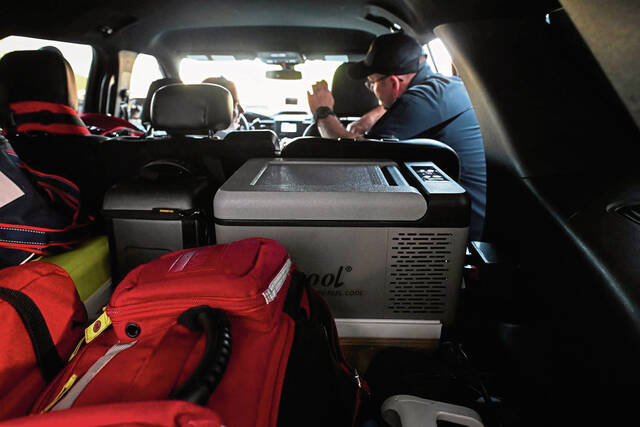https://development.triblive.com/local/westmoreland/greensburg-covers-10k-cost-of-blood-storage-coolers-for-mutual-aid-becomes-second-municipality-to-support-the-service/
Greensburg covers $10K cost of blood storage coolers for Mutual Aid, becomes 2nd municipality to support service

Greensburg will donate $12,000 to Mutual Aid EMS that will cover the cost of two blood storage coolers, becoming the second municipality to give direct financial support to the ambulance service.
Mutual Aid launched its blood program in May, outfitting two of its vehicles with bags of blood, transfusion equipment and a $5,000 cooler.
The initiative is meant to better care for patients with severe blood loss or hemorrhagic shock from vehicle accidents, gunshot wounds or postpartum bleeding, said Ken Bacha, director of community outreach.
“There’s a case there where it’s not just like an open wound where you can put a tourniquet on an arm or a leg or something like that,” Bacha said. “That’s where the blood comes into play.”
The Greensburg-based ambulance service was the second in Western Pennsylvania to provide a mobile blood transfusion program. Pittsburgh EMS launched its pilot blood program in 2023.
Two of Mutual Aid’s district chief vehicles house the coolers. The service has three district chiefs who travel to the most pressing calls in each of Mutual Aid’s three zones.
“They don’t sit,” Bacha said. “(District chiefs) are usually on the road jumping from call to call, so they’re out on the road constantly.”
Mutual Aid crews have administered blood four times in about two months, Bacha said — the first just one week after the coolers were installed.
Since the fall, the service also has stocked its ambulances with a drug called TXA, or tranexamic acid, which stops blood clots from breaking down. This has been administered at least 13 times, he said.
“This isn’t just a Mutual Aid asset. This is a regional asset,” Bacha said of the blood program. “This is something, if we got called into Penn Township to assist or into Rostraver or one of our other surrounding communities that are not actually part of (our coverage area) … that blood is available to anybody that needs it, not just our 33 municipalities.”
Greensburg councilman Gregory Mertz said the city is excited to support Mutual Aid.
“It really continues the conversation that our municipalities are talking about — stepping up to the table to donate to ambulance services,” he said.
Service seeks additional funding
Mutual Aid serves about 180,000 residents across its 900-square-mile coverage area in Westmoreland and Fayette counties. Behind Pittsburgh and Philadelphia EMS, it is the third-largest ambulance service in the state.
But unlike Pittsburgh and Philadelphia, Mutual Aid is not funded by taxpayer dollars. Apart from donations and grants, it relies on insurance reimbursements, which are unreliable, Bacha said.
“Say Councilman Zappone owned a restaurant, and my wife and I went there and had a pizza and a couple beers, and he handed us a check for $100,” he said. “And I said ‘Well, thank you, Mr. Zappone, but I’m only going to pay you $70 and I’m not going to pay you for 60, 90, 120 days. Unfortunately, that’s the way the billing system works.”
Mutual Aid purchased eight ambulances recently, each costing around $114,000 without additional equipment. Grant funding paid for seven of them, Bacha said.
Greensburg allotted $12,000 in its 2024 budget to support Mutual Aid. Most of it will be used to purchase the blood coolers.
“We felt comfortable with that,” said Mayor Robb Bell, “because we were paying for something that we could actually see and it was doing good, rather than just giving a lump of money and we have no idea where it’s going.”
By covering the cost of the coolers, the city will become the second municipality — after Jeannette — to financially support the ambulance service since its founding more than 50 years ago.
After abruptly closing the doors of its EMS service last July, Jeannette council agreed to pay Mutual Aid $1,000 a month to serve as the city’s ambulance provider — a move that has continued this year.
Mutual Aid would like to see more of its municipalities pitch in.
“We’ve really been hoping that municipalities start to step up and realize that they’re getting this service for free,” he said.
As budgeting season approaches, Greensburg Councilman Randy Finfrock does not anticipate any issues funding Mutual Aid for a second year.
“We absorbed $12,000 this year fairly easily,” he said, “so I would imagine we could do that again next year.”
Copyright ©2026— Trib Total Media, LLC (TribLIVE.com)
